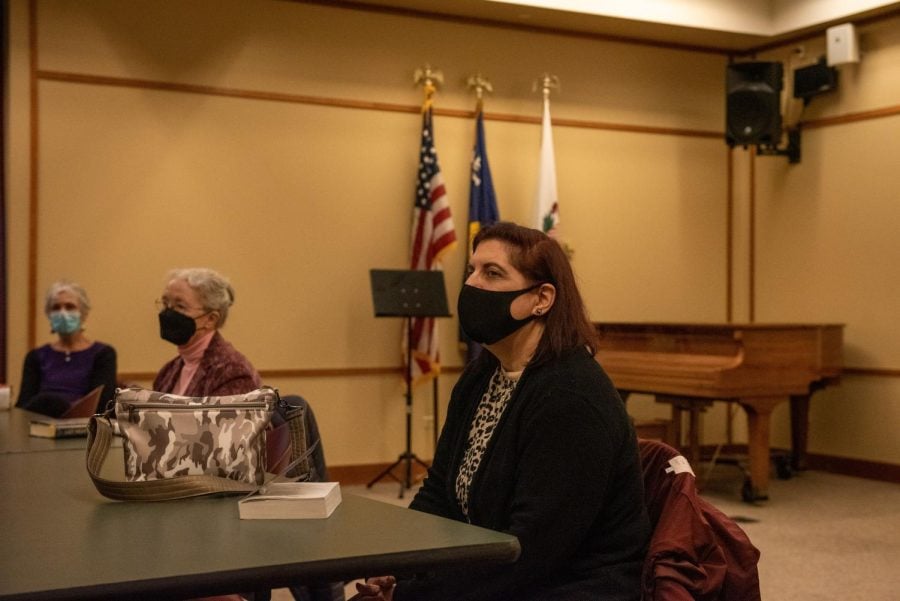EPL’s Better Off Read Book Group reflects on “Last Night at the Telegraph Club”
Jessica Ma/The Daily Northwestern
Better Off Read Book Group member Angela Pisano sits at the table with her copy of Malinda Lo’s “Last Night at the Telegraph Club,” participating in the book discussion.
May 24, 2022
As part of the Evanston Public Library’s programming for Asian American Pacific Islander Heritage Month, the Better Off Read Book Group discussed writer Malinda Lo’s historical fiction novel “Last Night at the Telegraph Club” at a Monday meeting. About 14 attendees gathered at EPL to respond to discussion questions and shared their reflections on the book.
The young adult novel follows Chinese American teenager Lily Hu as she navigates the immigrant experience and her first queer love in San Francisco’s Chinatown, circa 1954. Drawn to a lesbian bar called Telegraph Club, Hu explores her blossoming romance with classmate Kathleen Miller. The novel takes place during 1950s Red Scare paranoia and throughout the story, Hu grapples with the looming threat of her father’s deportation.
For the past seven years, Library Assistant Bridget Petrites has organized the monthly Better Off Read Book Group meetings. Petrites’s past selections came from a range of genres including poetry, nonfiction and graphic novels, she said. The group is geared towards adults, and some older residents have been meeting for several years.
Petrites said she chose “Last Night at the Telegraph Club” in celebration of AAPI Heritage Month. Petrites was also drawn to the young adult genre, she said, which offers a more youthful perspective on complex issues.
“The group has said one of the things they enjoy is (reading books that are) not necessarily things they would pick for themselves,” she said. “They like being … pushed a little bit outside of their comfort zone.”
Retired middle school teacher Rebecca Mestelle, who participated in the discussion, said the book could be examined in tandem with American history. Mestelle said the book provided a way to look at current immigration through a historical perspective.
Petrites said the group’s discussions aim to be a collaborative space for members to build on each other’s ideas.
“(Book groups) give you a window into someone else’s experience that is not your own,” Petrites said. “One of the things I think that’s so invaluable about book groups is (that) everybody brings their own experience.”
At the start of the meeting, members introduced themselves and described their favorite and least favorite books. With their copies of “Last Night at the Telegraph Club” laid out in front of them, members conversed in small groups.
During the meeting, Petrites asked the group to discuss the themes in the book that resonated with them.
Book group member Angela Pisano, who has attended the club for four years, said she appreciates how Petrites always contextualizes the discussion with background information, which tends to inspire thoughtful conversations. This time, Petrites led a conversation about literature from the teenage perspective, as well as generational differences within Chinese American families.
As a speech pathologist, Pisano said she was excited to see books centering marginalized voices becoming more widely available to young people. This generation of young people is the first with expansive access to books with a wide variety of sexuality and gender identities reflected within the characters they read about, she said.
“It’s important to see your identity or other identities … reflected in literature, because it’s almost one of the closest things we have to living in other peoples’ points of view,” Pisano said.
Jenette Sturges, EPL’s marketing and communications manager, said EPL aims to uplift works from diverse authors throughout the entire year. Inclusivity isn’t limited to a heritage month, she said.
Ultimately, Sturges said engaging with stories is a way for readers to practice empathy. Through celebrating AAPI joy, readers gain a more holistic understanding of peoples’ experiences that extends beyond generational pain, she added.
“Stories can only change us if we’re being exposed to new ideas,” Sturges said. “You … can put yourself in someone else’s shoes and experience the humanity.”
Email: jessicama2025@u.northwestern.edu
Twitter: @JessicaMa2025
Related Stories:
— MSA Queer Book Club, APIDA Book of the Quarter to hold discussions in winter
— EPL promotes multicultural connections through Gabriel García Márquez book club
— Evanston book clubs, literary drives expand elementary and middle school youth literacy


